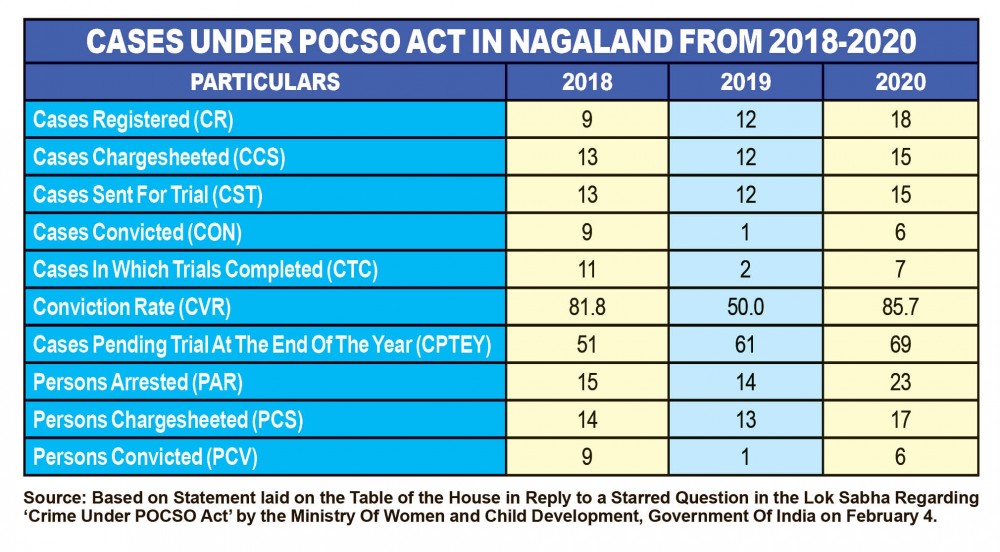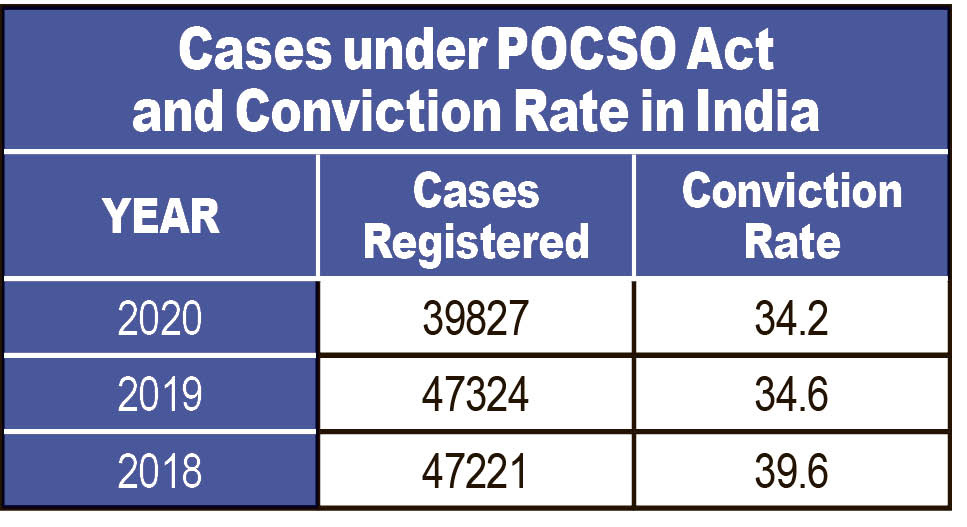
Morung Express News
Dimapur | February 7
Though among the lowest in India in number, cases registered (CR) under POCSO Act in Nagaland are on a rise and doubled between 2018 and 2020, State-wise data provided in the Lok Sabha informed.
 As per a statement laid in the Lower House of the Parliament on February 4 by the Union Minister of Women and Child Development (WCD), Smriti Zubin Irani, a total of 9 cases were registered under POCSO Act in 2018, which increased to 12 in 2019, denoting an increase by over 28%.
As per a statement laid in the Lower House of the Parliament on February 4 by the Union Minister of Women and Child Development (WCD), Smriti Zubin Irani, a total of 9 cases were registered under POCSO Act in 2018, which increased to 12 in 2019, denoting an increase by over 28%.
The cases registered once again increased in 2020 to 18, indicating 40% rise from 2019.
Accordingly, the cases doubled in three years from 9 to 18, possibly indicating increase in or rise in crimes under the Protection of Children from Sexual Offences (POCSO) Act in the State.
However, the conviction rate under the POCSO Act in Nagaland was among the highest in India at 85.7% in 2020 and 81.8 in 2018, though the rate was just 50.0% in 2019.
In 2020, while a total of 23 persons were arrested under POCSO, 17 were charge-sheeted while 6 were convicted. A total of 69 cases were pending at the end of the year in 2020.
No data was provided by the Minister for 2021.
Meanwhile, across India, while Case Registered under POCSO Act increased from 39,827 in 2018 to 47,324 in 2019, it decreased marginally to 47,221 in 2020.
As of December 31, 2021, a total of 700 Fast Track Special Courts (FTSCs) including 383 exclusive POCSO Courts are functional in 27 States or Union Territories UT which disposed 73,627 cases while 1,84,943 cases are pending, Irani further added.
The Minister was queried, among others, about cases registered, cases in which charge-sheets were filed, cases pending for trial, cases disposed of by courts and rate of conviction under the POCSO Act from 2018 till date across the country and action taken/proposed to be taken by the Government including sensitising all concerned about the Act.
What is POCSO Act?
The Act was enacted by the Government of India with the objective of providing “safeguards for children against sexual abuse. The act defines a child as any person below the age of 18 years.”
The POCSO Act 2012 provided for establishment of Special Courts for the purpose of ensuring speedy trial.
As per the Minister’s statement, the Act was amended in 2019 to introduce more stringent punishment including death penalty for committing sexual crimes on children, with a view to deter the perpetrators and prevent such crimes against children.
Further the POCSO Rules, 2020 were also notified by the Ministry to protect the children from exploitation/violence and sexual exploitation.
It included provisions for mandatory police verification of staff in schools and care homes, procedures to report child sexual abuse material (pornography), imparting age-appropriate child rights education, among other things.
The 2020 Rules also stipulated that the central government and every state government shall provide periodic training including orientation programmes, sensitisation workshops and refresher courses to all persons, whether regular or contractual, coming in contact with the children, to sensitise them about child safety and protection and educate them regarding their responsibility under the Act
Section 43 of the POCSO Act, 2012 provided that the Central Government and every State Government shall take all measures to give wide publicity to the provisions of the Act, she informed.
Steps taken in accordance with the Act
The WCD Minister also highlighted that Union Government has taken various steps from time to time to create awareness of the provisions of the POCSO Act through electronic and print media, consultations, workshops and training programmes with stakeholders concerned.
Further, the WCD Ministry notified 2020 Rules stipulating that the central government and every state government shall prepare age- appropriate educational material and curriculum for children, informing them about various aspects of personal safety, she said.
The Rules also stipulates that suitable material and information may be disseminated by the respective Governments in all public places such as panchayat bhavans, community centers, schools and colleges, bus terminals, railway stations, places of congregation, airports, taxi stands, cinema halls and such other prominent places and also be disseminated in suitable for min virtual spaces such as internet and social media, she added.
The Department of Justice, Government of India is implementing a centrally sponsored scheme for setting up of 1,023 FTSCs including 389 exclusive courts for expeditious trial and disposal of cases related to rape and POCSO Act, the Minister said.






